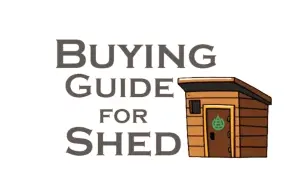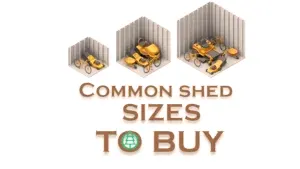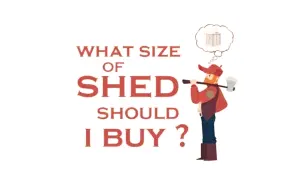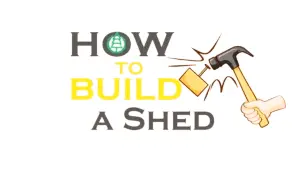Buy or Rent a Shed?
- July 6, 2023
- 0 comment
As an extension to your property or a separate entity within your garden, a shed can provide valuable storage space, act as a dedicated workspace, or become a personalized retreat. The question that often arises is whether to buy or rent a shed. The choice isn’t as straightforward as it may seem, with numerous factors at play, including your financial circumstances, long-term plans, and individual needs. In this detailed guide, we’ll dive deeper into the pros and cons of both options to aid you in your decision-making process.

Renting a Shed: A Temporary Solution with Flexibility
Renting a shed has become an increasingly popular option for those seeking a temporary solution for their storage or workspace needs. This option presents a low-risk commitment with maximum flexibility.
Pros of Renting a Shed
- Avoidance of Large Upfront Costs: The most obvious benefit of renting is the elimination of hefty upfront costs. You don’t need to save up for a big purchase; instead, you pay a manageable monthly fee. This is particularly beneficial for those who need immediate access to storage or workspace but are on a budget.
- Adaptability to Changing Needs: Life is unpredictable, and our storage needs can change rapidly. You might need more space when transitioning homes, renovating, or for a new hobby. Renting a shed gives you the flexibility to adjust the size of your shed or the duration of use as your needs evolve.
- Maintenance and Repair Responsibility: Generally, as a renter, you’re not responsible for the maintenance or repair of the shed. Any faults or issues can be reported to the rental company who will handle the necessary repairs, thus saving you time, stress, and money.
Cons of Renting a Shed
- Cumulative Cost Over Time: While the monthly rental fees might seem affordable, over time these payments can accumulate to a substantial sum, potentially exceeding the cost of buying a shed outright. This factor is especially relevant for those who foresee long-term shed usage.
- Absence of Ownership Rights: Renting a shed means you have no ownership rights. Any custom modifications or alterations that you wish to make, such as painting or installing shelves, may be restricted by the rental agreement.
- Potential for Long-Term Commitment: Some shed rental companies impose a minimum rental term. It’s crucial to be aware of the small print before signing any rental agreements. Early termination fees can add up if you decide to end the rental agreement ahead of schedule.
Buying a Shed: A Long-Term Investment
Buying a shed is traditionally considered a long-term investment. It involves a larger upfront payment, but you gain a durable asset that can meet your storage or workspace needs for many years to come.
Pros of Buying a Shed
- Complete Ownership: One of the most significant advantages of buying a shed is the full ownership it provides. You can modify, paint, or upgrade the shed to your heart’s content, tailoring the space to perfectly match your needs and preferences.
- Long-Term Cost-Effectiveness: Despite the larger initial investment, buying a shed can prove more cost-effective over the long term. If you plan on needing the shed for several years, the one-time cost of purchasing could end up being cheaper than ongoing rental payments.
- Property Value Increment: A well-built, aesthetically pleasing shed can increase the value of your property. It can be an attractive feature to potential homebuyers, especially if it integrates well with the overall landscaping and serves a functional purpose.
Cons of Buying a Shed
- High Upfront Costs: The initial cost of buying a shed can be substantial. Depending on the size, material, and features of the shed, the price can be quite high. For those on a tight budget, this upfront cost might be prohibitive.
- Maintenance and Repair Responsibilities: Owning a shed comes with the responsibility of regular maintenance and potential repair costs. Regular checks, treating the wood (if it’s a wooden shed), fixing any leakages, or handling pest issues – all of these are your responsibility as the owner.
- Depreciation Over Time: Much like a vehicle, sheds depreciate over time. The resale value of a shed is typically much lower than the purchase price, especially after several years of use. If you plan to sell the shed in the future, you may not recoup a large portion of your initial investment.
Additional Considerations
It’s important to take into account additional factors that could influence your decision:
- Location: Where will the shed be placed? If you are renting, you will need a site that can accommodate easy installation and removal. If you are buying, consider how the shed will integrate into your landscape design.
- Purpose: What is the purpose of the shed? Is it just for storage, or will it be a workspace? The use of the shed could influence the size and style you choose.
- Local Regulations: Be aware of any zoning laws, building codes, or HOA rules that might apply to you. Some areas may require permits for larger sheds, even if you are only renting.
- Quality: Whether renting or buying, you want a shed that is well-built and durable. Look at reviews, check the reputation of the company, and, if possible, inspect the shed in person before committing.
Conclusion
Choosing whether to rent or buy a shed ultimately hinges on your unique circumstances and needs. Renting offers a flexible, budget-friendly solution for temporary needs without the hassle of maintenance. However, the long-term cost can exceed the price of buying.
On the flip side, buying a shed is a significant investment, but it offers long-term value, customization options, and the potential to enhance your property’s value. It does come with the added responsibilities of maintenance and the possibility of depreciation.
Regardless of the option you choose, remember to take your time, conduct thorough research, and consider your long-term needs and financial circumstances. It’s not just about cost but about getting a solution that will serve you best in the long run.
Frequently Asked Questions
- What is the advantage of resin storage sheds over wooden or steel ones? Resin storage sheds offer a blend of durability and convenience. They are resistant to weather, decay, and pests, and require virtually no maintenance. In contrast, wooden sheds may require periodic treatment to prevent rot and insect damage, and steel sheds may rust over time if not properly cared for.
- Can I customize the interior of my shed? Yes, most sheds offer the flexibility for interior customization. You can add shelves, hooks, and other organizational tools. However, remember that heavy modifications might affect the warranty.
- Do these sheds come with a floor included? Most of the sheds mentioned come with a floor included, providing an additional layer of protection against ground moisture and pests. Always check the product specifications for each shed to confirm.
- What kind of base do I need for these sheds? A solid, level base is essential for any shed to ensure stability. This could be a concrete slab, paving stones, or treated wood deck. Check the manufacturer’s instructions for specific base requirements.
- Can I install these sheds myself? Yes, many of these sheds are designed for easy assembly, with some people able to complete the installation in a few hours. However, larger sheds or those made of heavy materials might require additional help or professional installation.
- Are these sheds weatherproof? The resin and galvanized steel sheds are designed to withstand a variety of weather conditions. However, while they can resist weather to a degree, extreme conditions might lead to wear and tear over time. Regular maintenance can help enhance the lifespan of your shed.
- Can these sheds accommodate large equipment like lawnmowers or bicycles? The larger sheds, like the 10-ft x 14-ft Lexington Galvanized Steel Storage Shed or the 12-ft x 8-ft Heartland Coronado Wood Storage Shed, should have ample space for storing large equipment. Always measure your items and check the shed’s internal dimensions to ensure a good fit.






Leave your comment